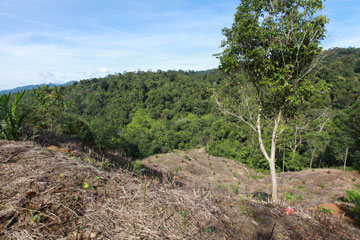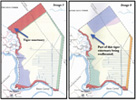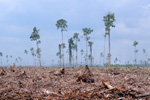
Sumatra rainforest canopy seen from the base of a compass tree . Photo by: Rhett A. Butler.
UPDATE: Greenpeace has stated that it has handed over evidence of illegal logging by APP suppliers to Indonesian police; an investigation looks likely.
A year-long undercover investigation has found evidence of Asia Pulp and Paper (APP) companies cutting and pulping legally protected ramin trees, a practice that violates both Indonesian and international law. Found largely in Sumatra’s peatswamp forests, the logging of ramin trees (in the genus Gonystylus) has been banned in Indonesia since 2001; the trees are also listed under Appendix II of the Convention on International Trade in Endangered Species (CITES) and thus require special permits to export. The new allegations come after APP, an umbrella paper brand, has lost several customers due to its continued reliance on pulp from rainforest and peatland forests in Sumatra, a practice that Greenpeace says is endangering the Sumatran tiger (Panthera tigris sumatrae) and orangutan (Pongo abelii) as well as generating massive carbon emissions.
“Greenpeace has caught Asia Pulp and Paper red-handed—this investigation shows its main pulp mill is regularly riddled with illegal ramin. This makes a mockery of their public claim to have a ‘zero tolerance’ for illegal timber,” said Bustar Maitar, Head of the Forests Campaign for Greenpeace Indonesia, in a press release.
The thorough investigation started with undercover visits to Indonesia’s largest paper mill, Indah Kiat Perawang, run by APP. Investigators took video footage of ramin logs waiting to be pulped on site, some up to a meter in diameter. Forty-six tissue samples were also taken from the logs and independently verified as ramin in a lab run by the Institute of Wood Technology and Wood Biology at the University of Hamburg.
 Sumatran orangutan in North Sumatra  Rainforest cleared for oil palm agriculture in North Sumatra. Photos taken by Rhett A. Butler. |
“Controversial logs do appear from time to time at the mill,” a representative of APP admitted to mongabay.com. “The wood checking stations at the mill remove the inventory and put the controversial logs in a separate quarantined area apart from the supply no as to not run the risk of contamination. The logs are retained as evidence, filed and reported. Suppliers are then penalized.”
But the investigation found that ramin logs were mixed-in with other unprotected species inside the mill gate. In addition, ramin trees are not supposed to be cut to begin with under Indonesian law.
“Ramin as you are aware is a protected tree species and is not cut. Often when you see a plantation area with the occasional ramin tree, it is because it is left standing (by law),” APP told mongabay.com last year.
In a statement from the brand today, APP reiterates that it has a “strict zero tolerance policy for illegal wood entering the supply chain” and employs a “comprehensive” system to keep illegal wood out. According to APP, before clearing a rainforest, their suppliers are supposed to note any protected trees and leave them standing. Checkpoints are then conducted before the logs reach the mill to ensure protected species are not on the trucks. Random tests on fiber in the mill is also conducted periodically.
“However, APP accepts that no system in the world, no matter how rigorous, is 100 percent failsafe,” APP’s statement today continues. “We welcome the recent report from Greenpeace International and will study it carefully—to ensure that we identify and act on any weaknesses in our chain of custody systems. It is APP’s desire to work with Greenpeace and other like-minded NGOs to improve our responsible sourcing policies and practices.”
APP says it has recently had an independent report done, which did not find any protected species in the mill. When asked to release details of the report a representative of APP told mongabay.com that the report “is not public” and “there are no immediate plans to publish the name of the auditors, although it is a very credible third party.”
Since 2001—when Indonesia listed ramin as protected—APP suppliers have logged at least 180,000 hectares of peatswamp forest according to Greenpeace. Peatswamp forests are critical habitat for the island’s remaining 400 Sumatran tigers and the Sumatran orangutan—both listed as Critically Endangered by the IUCN Red List—as well as thousands of other forest species, great and small. In addition the destruction of these forests and draining of the peatlands releases substantial greenhouse gas emissions, making Indonesia one of the world’s top greenhouse gas emitters.
After failing to keep two past pledges to forgo rainforest destruction for its paper products, APP has become a relentless target of NGOs like Greenpeace and WWF. Due to continued reliance on native rainforest, APP also lost Forest Stewardship Council’s (FSC) certification in 2007. Green groups have long accused APP of focusing more on slick PR campaigns and disinformation instead of actually cleaning up its operation on the ground.
“Greenpeace is calling on the [Indonesian] government to immediately seize all illegal ramin in APP’s operations in Indonesia,” Maitar says. “The evidence has been provided to authorities to assist in their efforts to improve governance in the forest sector. Any company buying from APP should distance themselves from this illegal rainforest scandal and stop buying from them until they clean up their act.”
Further analysis by Greenpeace found Indonesian rainforest fiber in products from several popular companies, including non-profit and scientific organization National Geographic, paper giant Xerox, retailer Wal-Mart, book company Barnes and Noble, and food company Danone among others. The products stemmed from rainforest timber milled at Indah Kiat Perawang, which links the companies not only to rainforest destruction, but also risks their exposure to illegally logged ramin. Since ramin is a protected species in Indonesia, its possible presence in U.S. products could lead to federal investigations.
“A product that comes into the US containing a CITES protected species like ramin with no legitimate paperwork should be grounds for a Lacey Act investigation an particularly if there’s repeated and robust evidence showing a pattern of the same practices,” Andrea Johnson with the Environmental Investigation Agency (EIA). The Lacey Act prohibits the sale and trade of wood products in the U.S. that are known to be illegally sourced.
In the past few decades, the island of Sumatra has become ground zero for rainforest destruction in Asia: between 1985 and 2007 Sumatra lost nearly half of its forest cover from logging, conversion into monoculture plantations, and forest fires. Beyond imperiling endangered species and massive carbon emissions, the deforestation crisis has also led to conflict with local people dependent on forests for their livelihoods.
Greenpeace video on investigation of ramin trees at APP mill.
Related articles
National Geographic linked to rainforest destruction

(03/01/2012) A new report by Greenpeace has found a direct link between National Geographic Society (NGS) products and rainforest destruction in Indonesia that threatens tigers and orangutans. An analysis on National Geographic books found Sumatran rainforest fiber from Asia Pulp and Paper (APP), a brand whose suppliers have been linked to rainforest destruction in Sumatra, and, in the most recent Greenpeace report, alleged illegal logging of protected rainforest trees. One of the world’s largest non-profit science and educational organizations, National Geographic is known worldwide for its magazines, documentaries, and award-winning photos. The organization also has a long-standing history of championing environmental and conservation issues.
Some toilet paper production destroys Indonesian rainforests, endangering tigers and elephants

(02/09/2012) American consumers are unwittingly contributing to the destruction of endangered rainforests in Sumatra by purchasing certain brands of toilet paper, asserts a new report published by the environmental group WWF. The report, Don’t Flush Tiger Forests: Toilet Paper, U.S. Supermarkets, and the Destruction of Indonesia’s Last Tiger Habitats, takes aim at two tissue brands that source fiber from Asia Pulp & Paper (APP), a paper products giant long criticized by environmentalists and scientists for its forestry practices on the Indonesian island of Sumatra. The brands — Paseo and Livi — are among the fastest growing, in terms of sales, in the United States.
Sumatran elephant population plunges; WWF calls for moratorium on deforestation
(01/24/2012) The Sumatran elephant subspecies (Elephas maximus sumatranus) was downgraded to critically endangered on IUCN’s Red List of Threatened Species on Tuesday, prompting environmental group WWF to call for an immediate moratorium on destruction of its rainforest habitat, which is being rapidly lost to oil palm estates, timber plantations for pulp and paper production, and agricultural use.
Extreme mouth-sewing protest in Indonesia leads to logging inquiry
(01/09/2012) A protest in which 28 Indonesian sewed their mouths shut has led to an inquiry into a logging concession on Padang Island. The Ministry of Forestry has formed a mediation team to look into the controversial concession, reports Kompas. Around a hundred natives of Padang Island rallied for weeks against the logging concession held by PT Riau Andalan Pulp and Paper (RAPP), which covers 37 percent of the island’s total land.
Mouths are sewn shut in protest against deforestation in Indonesia
(01/03/2012) Twenty-eight Indonesians have taken the extreme measure of sewing their mouths shut in a protest turned hunger-strike against a forest concession on Padang Island, reports the Jakarta Globe. Around a hundred protesters, mostly natives of Padang Island, have camped outside the Indonesian Senate building since December 19th to protest a logging concession held by PT Riau Andalan Pulp and Paper (RAPP) on their island, which lies off the east coast of Sumatra.
New analysis supports claim that paper giant cleared part of its tiger sanctuary in Indonesia

(12/21/2011) Asia Pulp & Paper (APP)’s supplier PT Ruas Utama Jaya has indeed cleared an area of forest it pledged to set aside as a tiger conservation reserve in Sumatra reports a legal analysis by Greenomics, an Indonesian environmental group. The Greenomics’ analysis supports allegations originally set forth in a report published last week by Eyes of the Forest, a coalition of green groups, and seems to refute a press release issued by APP that called the deforestation allegations ‘fiction’.
WWF: Asia Pulp & Paper misleads public about its role in destroying Indonesia’s rainforests

(12/16/2011) Asia Pulp & Paper (APP) continues to mislead the public about its role in destroying rainforests and critical tiger habitat across the Indonesian island of Sumatra, alleges a new report from Eyes on the Forest, a coalition of Indonesian environmental groups including WWF-Indonesia. The report, titled The truth behind APP’s Greenwash, is based on analysis of satellite imagery as well as public and private documentation of forest cleared by logging companies that supply APP, which is owned by the Indonesian conglomerate, Sinar Mas Group (SMG). The report concludes APP’s fiber suppliers have destroyed 2 million hectares of forest in Sumatra since 1984.